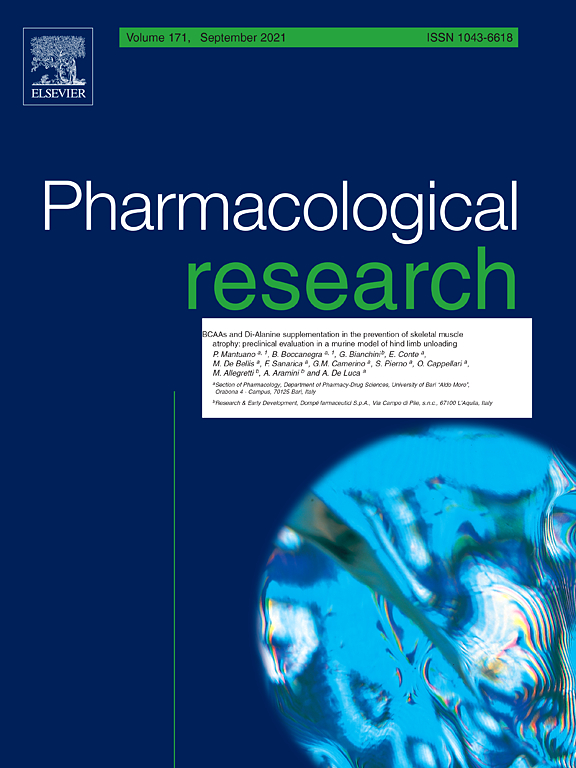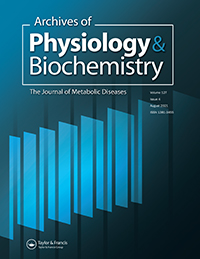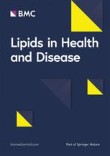Adiponectin
How to submit an article:
- Registered users can submit any published journal article that has a unique DOI (Digital Object Identifier) name or link to Research Hub.
- For example, you can paste the full DOI link:
https://doi.org/10.1109/5.771073or just the DOI name:10.1109/5.771073into the field above and click submit. - The person who is first to submit a valid article to Research Hub will forever be credited for it, and every article submission earns you +6 Research Points.
Published research studies are articles that present the findings of original research that has undergone a peer-review process and has been made publicly available in scholarly journals, books or other media.

Coffee or tea: Anti-inflammatory properties in the context of atherosclerotic cardiovascular disease prevention
2023 Jan Pharmacological Research Surma S, Sahebkar A, Banach M
Review Article Meta-Analysis Cardiovascular Disease Coffee Anti-Inflammatory TeaConsumption of tea and coffee may possibly provide anti-inflammatory effects, contributing to reduced cardiovascular risk and mortality.

Traditional Chinese Medicine formula FTZ protects against polycystic ovary syndrome through modulating adiponectin-mediated fat-ovary crosstalk in mice
2021 Mar Journal of Ethnopharmacology Xu Y, Tang J, Guo Q, Xu Y, Yan K, Wu L, et al.
Our data collectively demonstrate that FuFang ZhenZhu TiaoZhi (FTZ) exerted preventive benefits in an experimental model of PCOS, at least partially by potentiating the production of adiponectin from adipose tissues. This suggests that FTZ is a promising treatment for PCOS.
Animal Study Fu Fang Zhen Zhu Tiao Zhi formula
Effects of green tea supplementation on serum concentrations of adiponectin in patients with type 2 diabetes mellitus: a systematic review and meta-analysis
2020 Nov 20 Archives of Physiology and Biochemistry Asbaghi O, Fouladvand F, Ashtary-Larky D, Bagheri R, Choghakhori R, Wong A, et al.
Systematic Review Meta-Analysis Green Tea Type 2 Diabetes AdiponectinGreen tea supplementation raises adiponectin levels in patients with type 2 diabetes mellitus.

Effect of Mediterranean Diet Enriched in High Quality Extra Virgin Olive Oil on Oxidative Stress, Inflammation and Gut Microbiota in Obese and Normal Weight Adult Subjects
2019 Nov 15 Frontiers in Pharmacology Luisi MLE, Lucarini L, Biffi B, Rafanelli E, Pietramellara G, Durante M, et al.
The Mediterranean Diet (MD) enriched with High Quality-Extra Virgin Olive Oil (HQ-EVOO) led to a significant decrease in markers of inflammation and oxidative stress, an increase in anti-inflammatory cytokines (IL-10 and adiponectin), and a substantial increase in Lactic Acid Bacteria (LAB) in the gut microbiota of overweight/obese subjects, suggesting its potential role in preventing inflammation.
Experimental Study Clinical Study Gut Microbiota Oxidative Stress Inflammation
Consumption of coffee or caffeine and serum concentration of inflammatory markers: A systematic review
2017 Nov 03 Critical Reviews in Food Science and Nutrition Paiva CLRS, Beserra BTS, Reis CEG, Dorea JG, Da Costa THM, Amato AA
Experimental Study Systematic ReviewCoffee consumption, particularly caffeinated coffee, predominantly exhibits anti-inflammatory effects, contrasting with caffeine's complex impact on inflammation.
Research insights are moderated by the Research Hub team and offer an at-a-glance overview of interesting research findings.

2023 Pharmacological Research
Consumption of tea and coffee may possibly provide anti-inflammatory effects, contributing to reduced cardiovascular risk and mortality.
Review Article Anti-Inflammatory Cardiovascular Disease Coffee Tea
Coffee or tea: Anti-inflammatory properties in the context of atherosclerotic cardiovascular disease prevention
Surma S, Sahebkar A, Banach M

2020 Archives of Physiology and Biochemistry
Green tea supplementation raises adiponectin levels in patients with type 2 diabetes mellitus.
Systematic Review Green Tea Type 2 Diabetes
Effects of green tea supplementation on serum concentrations of adiponectin in patients with type 2 diabetes mellitus: a systematic review and meta-analysis
Asbaghi O, Fouladvand F, Ashtary-Larky D, Bagheri R, Choghakhori R, Wong A, et al.

2017 Critical Reviews in Food Science and Nutrition
Coffee consumption, particularly caffeinated coffee, predominantly exhibits anti-inflammatory effects, contrasting with caffeine's complex impact on inflammation.
Experimental Study
Consumption of coffee or caffeine and serum concentration of inflammatory markers: A systematic review
Paiva CLRS, Beserra BTS, Reis CEG, Dorea JG, Da Costa THM, Amato AA

2016 Lipids in Health and Disease
A sardine-enriched diet may have beneficial effects on cardiovascular risk and alters gut microbiota composition in patients with type 2 diabetes.
Randomised Controlled Trial Cardiovascular Risk Gut Microbiota Sardine Type 2 Diabetes
Effects of sardine-enriched diet on metabolic control, inflammation and gut microbiota in drug-naïve patients with type 2 diabetes: a pilot randomized trial
Balfegó M, Canivell S, Hanzu FA, Sala-Vila A, Martínez-Medina M, Murillo S, et al.
Review Articles
Review articles summarise and critically evaluate the current state of research on a specific topic or field by synthesising multiple primary research studies.

Coffee or tea: Anti-inflammatory properties in the context of atherosclerotic cardiovascular disease prevention
2023 Jan Pharmacological Research Surma S, Sahebkar A, Banach M
Review Article Meta-Analysis Cardiovascular Disease Coffee Anti-Inflammatory TeaConsumption of tea and coffee may possibly provide anti-inflammatory effects, contributing to reduced cardiovascular risk and mortality.

Effects of green tea supplementation on serum concentrations of adiponectin in patients with type 2 diabetes mellitus: a systematic review and meta-analysis
2020 Nov 20 Archives of Physiology and Biochemistry Asbaghi O, Fouladvand F, Ashtary-Larky D, Bagheri R, Choghakhori R, Wong A, et al.
Systematic Review Meta-Analysis Green Tea Type 2 Diabetes AdiponectinGreen tea supplementation raises adiponectin levels in patients with type 2 diabetes mellitus.

Consumption of coffee or caffeine and serum concentration of inflammatory markers: A systematic review
2017 Nov 03 Critical Reviews in Food Science and Nutrition Paiva CLRS, Beserra BTS, Reis CEG, Dorea JG, Da Costa THM, Amato AA
Experimental Study Systematic ReviewCoffee consumption, particularly caffeinated coffee, predominantly exhibits anti-inflammatory effects, contrasting with caffeine's complex impact on inflammation.
Clinical Trials
Clinical trials are research studies that involve people and are conducted to evaluate the safety and efficacy of new treatments or interventions, such as drugs, medical devices, or behavioural therapies.
Study Protocols
Published study protocols are detailed plans that outline the objectives, methodology, statistical analyses, and organisation of a research study that have been made publicly available for others to review and use as a reference.
Presentation Slides

Review Article
Consumption of tea and coffee may possibly provide anti-inflammatory effects, contributing to reduced cardiovascular risk and mortality.
Surma S, Sahebkar A, Banach M

Systematic Review
Green tea supplementation raises adiponectin levels in patients with type 2 diabetes mellitus.
Asbaghi O, Fouladvand F, Ashtary-Larky D, Bagheri R, Choghakhori R, Wong A, Baker JS, Abbasnezhad A

Experimental Study
Coffee consumption, particularly caffeinated coffee, predominantly exhibits anti-inflammatory effects, contrasting with caffeine's complex impact on inflammation.
Paiva CLRS, Beserra BTS, Reis CEG, Dorea JG, Da Costa THM, Amato AA

Randomised Controlled Trial
A sardine-enriched diet may have beneficial effects on cardiovascular risk and alters gut microbiota composition in patients with type 2 diabetes.
Balfegó M, Canivell S, Hanzu FA, Sala-Vila A, Martínez-Medina M, Murillo S, Mur T, Ruano EG, Linares F, Porras N, Valladares S, Fontalba M, Roura E, Novials A, Hernández C, Aranda G, Sisó-Almirall A, Rojo-Martínez G, Simó R, Gomis R
Executive Summary
Write an executive summary in the form of a blog article on the topic of "Research into Chinese medicine treatment for Adiponectin" summarising the research below and using language that can be easily understood by patients and avoiding medical jargon using a professional and caring tone of voice.
Write an executive summary in the form of a blog article on the topic of "Researched Chinese medicine treatments for Adiponectin" summarising the research below in an objective and easy to understand way, and using language that can be easily understood by patients. Group the article into Chinese medicine treatments first, followed by nutrition and other treatments. Avoid using medical jargon and use a professional and caring tone of voice.
Write me a concise but easy to understand executive summary on the topic of "Chinese medicine treatments for Adiponectin" based on the following research that I will give you. Your summary should be 2 paragraphs long in Australian English spelling and include references to the studies.
A Review Article published in 2023 in the journal Pharmacological Research found that Consumption of tea and coffee may possibly provide anti-inflammatory effects, contributing to reduced cardiovascular risk and mortality. The methodology of this narrative review examined the potential anti-inflammatory properties of consuming tea and coffee as a factor in reducing the risk of cardiovascular disease. This was done by analyzing a plethora of studies and meta-analyses that explored the impact of diet on inflammation, with a keen focus on the consumption of these beverages. The studies looked at a variety of risk factors for atherosclerotic cardiovascular disease, including inflammation biomarkers such as C-reactive protein, along with the impact of modern lipid-lowering treatments. In discussing the results, it was noticed that inconsistent findings were produced from the analysed studies which made a conclusive determination challenging. However, a trend was observed where drinking tea and coffee seemed to raise adiponectin levels, reduce reactive oxygen species and lower low-density lipoprotein cholesterol levels. Despite these potential anti-inflammatory properties of tea and coffee being somewhat uncertain due to various confounding factors, their consumption is still recommended as part of a healthy diet.
A Systematic Review published in 2020 in the journal Archives of Physiology and Biochemistry found that Green tea supplementation raises adiponectin levels in patients with type 2 diabetes mellitus. For the methodology, an exhaustive search was undertaken in multiple databases including ISI Web of Science, PubMed, Embase, and Scopus to collect research articles pertaining to the effects of green tea supplementation on adiponectin levels in patients with type 2 diabetes up to June 2019. Both random and fixed effects models were employed in the meta-analyses as appropriate. The results of the data gathered from five trials incorporating 333 type 2 diabetic patients show that the implementation of green tea supplementation leads to a notable increase in adiponectin levels when compared to control groups. It showcases the potential role of green tea in managing diabetes through the modulation of adiponectin concentrations.
A Experimental Study published in 2017 in the journal Critical Reviews in Food Science and Nutrition found that Coffee consumption, particularly caffeinated coffee, predominantly exhibits anti-inflammatory effects, contrasting with caffeine's complex impact on inflammation. The study analysed 15 clinical trials concerning the impact of coffee, caffeine, or coffee components on inflammatory markers. Of these, eight focused on coffee and seven on caffeine with no regard for publication date. These trials tested, under varying conditions, the effect of coffee or caffeine consumption against placebos, or compared inflammatory marker levels before and after consumption. There was no discrimination of the used coffee's processing method, whether filtered or medium/dark roasted. The study discovered that, out of the seven trials comparing filtered coffee/caffeinated coffee with a placebo, or comparing baseline levels versus post-consumption, adiponectin levels increased in four. On the other hand, caffeine trials showed no change. C-reactive protein (CRP) levels remained unchanged in all five studies that considered the effects of coffee. Interestingly, only one out of three trials showed decreased CPR levels in reaction to caffeine. Additionally, Interleukin (IL)-6 level increased when caffeinated coffee was compared with placebo in one out of four coffee trials and with caffeine in three out of five studies. Finally, caffeine consumption resulted in increased IL-10 levels in two out of three trials.
A Randomised Controlled Trial published in 2016 in the journal Lipids in Health and Disease found that A sardine-enriched diet may have beneficial effects on cardiovascular risk and alters gut microbiota composition in patients with type 2 diabetes. In the study, 35 patients who were recently diagnosed with type 2 diabetes were divided into two random groups. One was set to follow a standard diet recommended for diabetes (control group), and the other followed similar guidance but included 100 grams of sardines in their diet five days a week (sardine group) for a duration of six months. Scientists measured their anthropometric and dietary information, fasting glycated hemoglobin, glucose, insulin, adiponectin, inflammatory markers, erythrocyte membrane fatty acid composition and specific bacterial strains before and after the dietary intervention. In the conclusion, there was no significant difference in glycemic control between the two groups by the end of the course. However, both sets of patients recorded a decrease in plasma insulin. Most notably, the sardine group also saw an increase in adiponectin levels and the omega-3 index, while decreasing the Firmicutes/Bacteroidetes ratio in gut microbiota composition. It advanced the hypothesis, even though the sardine-enriched diet did not significantly alter glycemic control, it could potentially be beneficial in managing cardiovascular risk in type 2 diabetes patients.
Moderation Tools
Topic
Sign In
Users not signed in are limited to viewing the 5 most recent items of content.